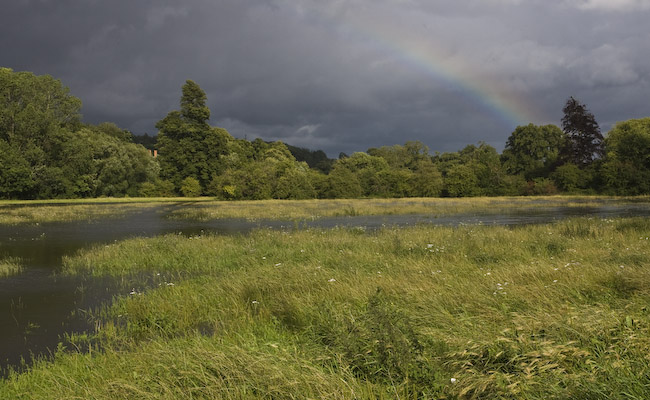I've been thinking about memories lately. Not memories about things that have just happened but memories about things that happened to me some time ago. Things that have lost their sheen of newness and have taken on the smoothness and warmth of age. Let me cite an example: I remember seeing the Mona Lisa in "real life" for the first time about 5 years ago. I remember walking up to it and joining the crowd surrounding it and then looking at the eyes and then the face.
Now my question is: How do I know that these memories are real? Or to put it another way: How do I know that I actually experienced what I remember?
Let us examine the above example to clarify my question. OK I remember seeing the Mona Lisa hanging on a wall in the Louvre. But how do I know that I saw it. Notice I don't ask how I know I was in the Louvre or Paris or France. These I can verify because I retain the tickets, hotel bills etc. There is, of course, a deeper question about whether these themselves are real but that is not part of this discussion. Let us assume for the moment that these are real. Therefore I can prove that I was in the Louvre museum in Paris at a certain time and that at that time the Mona Lisa was hanging on a wall there.
OK So far so good but this still does not prove that I actually saw the painting only that I have a memory of so doing. Now we know that the mind is an imperfect organ and can forget things and have hallucinations. Could this memory not be one of those. I mean I know what the Mona Lisa looks like. I have seen it in books. But did I actually see it? I have to say that I don't know. I feel that I did but logically I cannot be certain.
Even memories for which I have some form of verification (picture etc.) are suspect because, although the verification is real my memories of how I obtained it may not be. Another example may be in order here: I have a memory of going to Skokholm Island in Wales with some friends to photograph. Whilst there I remember seeing a whole lot of Atlantic Puffins and one in particular:
 Now I remember seeing this puffin and taking the image. I remember how I was feeling (happy) and what the weather was like (grey clouds) but how much of this is "real" and how much imagined? Another example: I remember when my son was born. I remember seeing him (in an incubator) the first time. I remember holding him and so on but that was 23 years ago. I have my son and I know he is real but how do I know that my first memories of him are? Again I feel they are but how can I prove it logically? I know that with my limited analytical abilities I cannot. To be honest I'm not sure you can.
Now I remember seeing this puffin and taking the image. I remember how I was feeling (happy) and what the weather was like (grey clouds) but how much of this is "real" and how much imagined? Another example: I remember when my son was born. I remember seeing him (in an incubator) the first time. I remember holding him and so on but that was 23 years ago. I have my son and I know he is real but how do I know that my first memories of him are? Again I feel they are but how can I prove it logically? I know that with my limited analytical abilities I cannot. To be honest I'm not sure you can.
If I am responsible for creating my world and my existence within it then why do I sometimes fail?
 Hope is all we have.
Hope is all we have.
(Image copyright (c) 2007 Adrian North Photography)
One thing that has fascinated me for a long time is the whole area surrounding communication and language. We are, after all, as a species compulsive communicators. We may not be (and are most likely not to be) the only species that communicates but we do do it rather a lot. The questions I have about this include: Why do we communicate? How did this communication originate? How did language originate? Where did languages diverge from each other? Why are there similarities and differences between certain human languages?
I know there are minds greater than mine pondering these questions and that I can only, of necessity, study them on a somewhat simplistic level. Indeed I do not even pretend to have any answers. I do, however, have some thoughts which I will lay out in the coming weeks. However let me initially look at the first question: "Why do we communicate?"
If the reason were only to get what we want then any communications would simply be a series of negotiations. I have tried to analyse my communications recently and whilst there are a lot of communications that do fall under this category there are some that don't. As an example: I see a man walking under a ladder when a workman above drops a brick. I shout to warn the person. That is communication but, as far as I can see, was not communication that gains me anything but it is communication nonetheless. So either there is more than one reason why we communicate or there is a deeper, more fundamental reason. My own personal feeling (and this is just a feeling. I have, as yet, no objective foundation for it) is that there is a more fundamental reason. I think it will be useful to investigate this in depth. Who knows maybe a universal truth lies hidden at the heart of the question. Communication is, after all, something that binds all humanity together. It is what we all have in common.
Oh dear it seems such a long time since I posted anything here. OK, it is such a long time since I posted anything here. I really must get my life sorted out. Anyway I'm back! And I have a whole new series of questions that I need answering. I hope you're ready for it.
 Now I remember seeing this puffin and taking the image. I remember how I was feeling (happy) and what the weather was like (grey clouds) but how much of this is "real" and how much imagined? Another example: I remember when my son was born. I remember seeing him (in an incubator) the first time. I remember holding him and so on but that was 23 years ago. I have my son and I know he is real but how do I know that my first memories of him are? Again I feel they are but how can I prove it logically? I know that with my limited analytical abilities I cannot. To be honest I'm not sure you can.
Now I remember seeing this puffin and taking the image. I remember how I was feeling (happy) and what the weather was like (grey clouds) but how much of this is "real" and how much imagined? Another example: I remember when my son was born. I remember seeing him (in an incubator) the first time. I remember holding him and so on but that was 23 years ago. I have my son and I know he is real but how do I know that my first memories of him are? Again I feel they are but how can I prove it logically? I know that with my limited analytical abilities I cannot. To be honest I'm not sure you can.